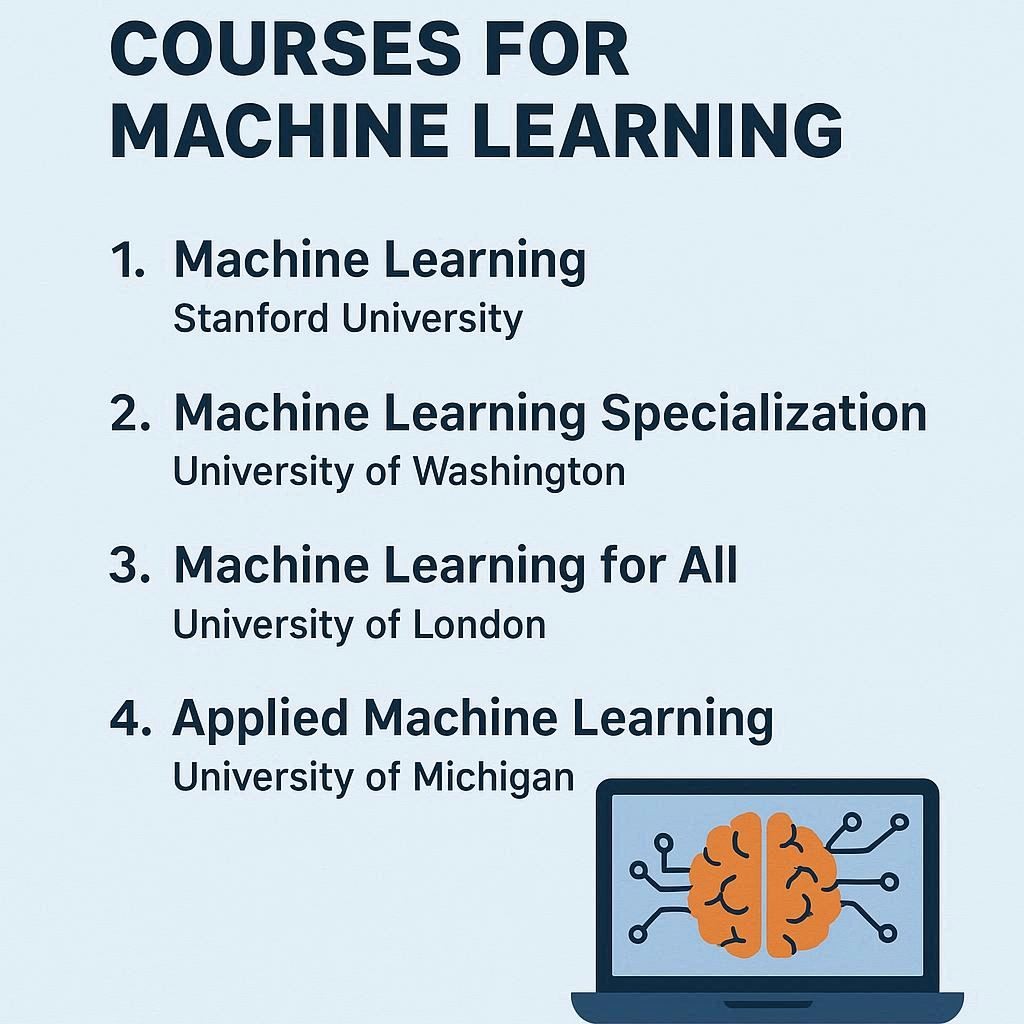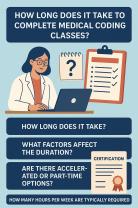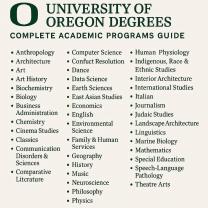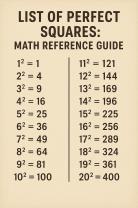Which Coursera course is best for machine learning?
If you're looking to dive into machine learning on Coursera, here are some of the top-recommended courses and programs in 2025—organized by your experience level and goals:
Best Coursera Courses for Machine Learning
1. "Machine Learning" by Stanford University (Andrew Ng)
This is a foundational, classic course that uses Octave/MATLAB and covers core algorithms and theory.
It's highly acclaimed, with millions of learners and continues to be one of the most popular entry points into ML.
Great for those who want a strong theoretical launchpad.
2. University of Washington – Machine Learning Specialization
A more structured, hands-on series of 4 courses taught by Emily Fox and Carlos Guestrin.
Covers prediction, classification, clustering, information retrieval, with applied Python projects and real datasets.
3. DeepLearning.AI – "Supervised Machine Learning: Regression and Classification"
Part of the DeepLearning.AI family, this course has a stellar 4.9 rating and ~30K reviews.
Focuses on hands-on machine learning models using scikit-learn, Jupyter, and Python.
+1
4. IBM – Machine Learning with Python / Professional Certificate
Covers both supervised and unsupervised learning, feature engineering, regression, classification, and more—all in Python.
Available both as a standalone course and part of a job-ready professional certificate program.
5. DeepLearning.AI – Mathematics for Machine Learning and Data Science
Tackles the mathematical underpinnings—stats, probability, linear algebra, calculus—critical for deeper ML understanding.
6. University of London – "Machine Learning for All"
A beginner-friendly, non-technical introduction with practical context and a project module.
Ideal for anyone getting started or coming from non-technical backgrounds.
+1
7. Amazon Web Services – "Fundamentals of Machine Learning and Artificial Intelligence"
Focuses on machine learning via AWS tools like SageMaker—great for applied, industry-aligned skills.
+1
Quick Recommendation Guide
| Your Goal/Audience | Recommended Course(s) |
|---|---|
| Strong theoretical foundation | Stanford Machine Learning (Andrew Ng) |
| Applied learning & Python projects | UW Machine Learning Specialization, IBM ML with Python |
| Hands-on model-building | Supervised ML: Regression & Classification (DeepLearning.AI) |
| Build mathematical fluency for ML | Mathematics for Machine Learning and Data Science (DeepLearning.AI) |
| Light introduction/non-technical overview | Machine Learning for All (University of London) |
| Industry tools & deployment focus | AWS Fundamentals: ML & AI (Amazon Web Services) |
Insights from Learners
One enthusiastic learner on Reddit shared their progression:
"Finished the math for ML on Coursera, almost done the ML Specialization, and doing the deep learning specialization next... it's been a great progression of laying foundation layers."
Final Thoughts
For an all-around foundation, start with Andrew Ng’s Stanford ML course.
If you're more hands-on and want projects, the UW specialization or IBM certificate are structured and practical.
Want to reinforce your math? Dive into DeepLearning.AI’s math course.
Prefer a smooth non-tech path? Try "Machine Learning for All".
Geared toward real-world application and deployment? Check out AWS’s ML module.
This document provides a detailed overview of top-rated machine learning courses on Coursera, addressing common questions about content, cost, and time commitment.
1. Top Machine Learning Courses on Coursera
For newcomers and those seeking a foundational understanding, the Machine Learning Specialization by Andrew Ng is widely regarded as the best starting point. This course, offered in partnership with DeepLearning.AI and Stanford Online, provides a broad introduction to modern machine learning.
Other highly-rated and popular specializations and courses include:
Deep Learning Specialization (DeepLearning.AI): An intermediate-level program that dives into neural networks and deep learning.
IBM Machine Learning Professional Certificate: A multi-course program that covers practical ML skills using Python.
Mathematics for Machine Learning and Data Science Specialization (Imperial College London): This is excellent for learners who want to build a strong mathematical foundation for machine learning, covering linear algebra, calculus, and probability.
Applied Data Science with Python Specialization (University of Michigan): Focuses on applying machine learning techniques using Python and popular libraries.
2. Topics Covered in Top Courses
The topics covered vary by course and specialization, but generally, a good machine learning curriculum will include:
Core Concepts: Supervised learning (e.g., regression, classification), unsupervised learning (e.g., clustering, dimensionality reduction), and reinforcement learning.
Algorithms: Linear regression, logistic regression, k-means clustering, support vector machines (SVM), decision trees, and random forests.
Neural Networks and Deep Learning: Fundamentals of neural networks, backpropagation, and training deep learning models with frameworks like TensorFlow and PyTorch.
Practical Skills: Data preprocessing, feature engineering, model evaluation, and best practices for developing machine learning applications.
Programming Languages and Libraries: Most courses utilize Python and libraries such as NumPy, scikit-learn, and TensorFlow.
3. How to Choose the Right Course
To select the best course for your needs, consider the following:
Your Primary Goal:
Career Advancement: If you're looking to gain job-ready skills, professional certificates and specializations (like the IBM or Andrew Ng specializations) are often the best choice as they include hands-on projects and a shareable certificate.
Practical Application: If you want to apply ML to solve real-world problems, courses that emphasize practical skills with Python (e.g., "Applied Machine Learning in Python") are a good fit.
Deep Understanding: If you want to grasp the underlying theory and mathematics, courses like the "Mathematics for Machine Learning" specialization are highly recommended.
Prerequisites: Assess your current skill level. Most beginner-level courses require a basic understanding of coding (Python is preferred) and high-school level mathematics (algebra, functions). More advanced courses may require knowledge of linear algebra and calculus.
4. Free vs. Paid Courses on Coursera
Coursera operates on a freemium model. While many courses are part of a paid subscription, you have several options:
Free Audit: Most courses can be "audited" for free. This gives you access to lectures, readings, and some graded assignments, but you will not be able to submit all assignments or earn a course certificate.
Paid Subscription: To unlock full course content, assignments, and a shareable certificate, you will need to pay for the course or a Coursera Plus subscription, which costs approximately $49 to $59 per month.
Financial Aid: Coursera offers financial aid for learners who cannot afford the fee. You can apply for this aid to get full access to a course and a certificate.
5. Course Duration
The time it takes to complete a machine learning course on Coursera varies significantly depending on the format and your pace.
Single Courses: Can range from a few weeks to 1-3 months. For example, some courses are designed to be completed in about 1-4 weeks at a pace of 5-10 hours per week.
Specializations (Multi-course programs): These are longer and can take anywhere from 2 to 6 months to complete if you're dedicating a few hours each week. For instance, Andrew Ng's Machine Learning Specialization is estimated to take about 2 months to complete at a pace of 10 hours per week.
Keep in mind that all courses are self-paced, so you can adjust your study schedule to fit your personal timeline.













